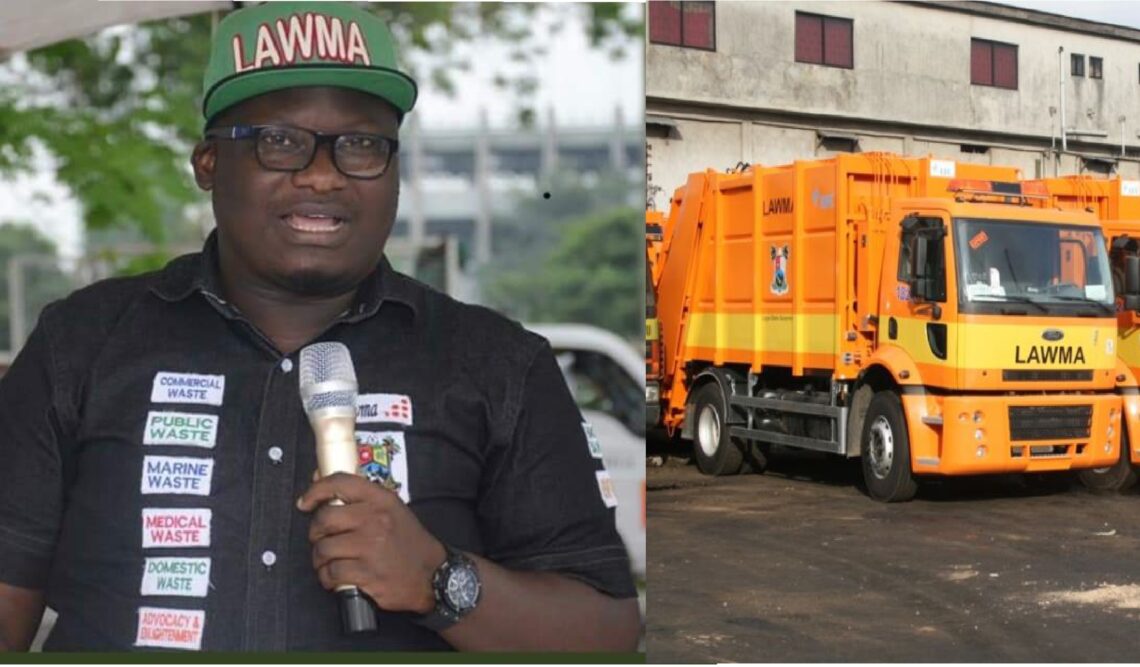...To get all news updates, Join our WhatsApp Group (Click Here)
Also Join our WhatsApp Channel (Click Here)
Ibrahim Odumboni, the acting managing director of the the Lagos Waste Management Authority (LAWMA) has been accused of allegedly flouting procurement law and selling multi-million naira vehicles of the Authority as scrap, PREMIUM TIMES reported.
When Ibrahim Odumboni was appointed acting managing director (MD) of the Lagos Waste Management Authority (LAWMA) in May 2020, the Governor of Lagos State, Babajide Sanwo-Olu, was confident he was the perfect fit for the job.
In a statement, Mr Sanwo-Olu said the former banker would bring his wealth of experience as a former LAWMA executive director in charge of business development to revitalise the often-troubled agency.
Mr Odumboni replaced Muyiwa Gbadegesin, who was removed for infractions including allegations of misappropriation of funds.
However, the tenure of the 40-year-old Mr Odumboni has also now become controversial, with some officials querying his management of the agency’s assets.
In one instance, Mr Odumboni was queried by the state’s commissioner for environment for selling at least 55 mostly serviceable heavy-duty vehicles and a D9 bulldozer as scraps without following due process, and at a cost the commissioner described as ‘alarmingly undervalued.’
Between March 4 and 6, 2021, Mr Odumboni directed the disposal of 22 trucks, one engine and a D-9 bulldozer, located at LAWMA’s depot in Agege and Ikeja, documents seen by PREMIUM TIMES revealed.
LAWMA staffers aware of the sale said many of the vehicles were still serviceable at the time they were sold as scrap. The vehicles were sold to Blackcann Limited, a scrap metal company.
LAWMA officials knowledgeable about the transfer of the vehicles to Blackcann Limited told PREMIUM TIMES the vehicles were moved from the depots at night in what they said appeared a move to evade questions about their destination from inquisitive officials.
The vehicles comprised four Man Diesel compactors, 10 Mercedes Benz compactors, four Mack compactors, one Hof compactor and two Daf compactors, from the Agege Transfer Loading Station (TLS). The engine scrap was also stationed at the Agege TLS. Others were a bulk mover and M29 compactor from the Ikeja depot. The D-9 bulldozer was moved from the Solous depot in the Alimosho area of the state.
In a memo authorising Blackcann Limited to take possession of the vehicles, Mr Odumboni claimed they were being removed from the depot for “assembling”.
“I hereby authorised Messrs Blackcann Limited to move all scrap metal and beyond Economic Economic Repair (BER) trucks at the depot to Lagos Waste Management Authority facility at Ikorodu for assembling,” Mr Odumboni stated in the memo dated March 4, 2021.
However, PREMIUM TIMES obtained release vouchers signed at the Agege depot before the vehicles were released, which tell a different story. The vouchers indicate that the vehicles were taken by LAWMA’s Engineering Department to either “Ikorodu Road,” or “Owode Onirin”, a popular scrap metal market along Ikorodu Road.
Also, contrary to the claim in the memo that the vehicles were taken from the depots for assembling, the release vouchers stated that they were taken for “safekeeping”.
A LAWMA official who asked not to be named for fear of being victimised pointed out further inconsistencies in the MD’s memo.
“LAWMA does not have any facility in Ikorodu,” the official said. There are only two sites remotely associated with LAWMA in the town, one is a dumpsite at Ewu-Elepe, the other place is a moribund Public-Private Partnership (PPP) project between Earthcare, a compost fertiliser manufacturer and LAWMA at Odoguyan along Shagamu Road.”
“It was a blatant lie to even say the vehicles were being taken for assembling. What does he mean by that? Are the vehicles going to be put together to manufacture new ones? In fact, our engineering department is stationed at our head office in Ijora, and repairs of vehicles are either done at our depots or at Ijora,” the source added.
The official claimed that each of the compactors was worth at least N2 million and the D-9 bulldozer was worth at least N20 million when they were sold.
When reached for comment about the disposal of the vehicles, Peter Benjamin-Black, the CEO of Blackcann Limited, declined to comment. During a telephone interview, he told this reporter to direct the questions to LAWMA.
Mr. Odumboni may have flouted the state’s procurement law in the manner he disposed the vehicles.
Section 80 (2) of the Lagos State Public Procurement Law states that “the open competitive bidding shall be the primary source of receiving offers for the purchase of any public property offered for sale”
The law defines Open Competitive Bidding as ”the solicitation of bids from domestic contractors and suppliers registered or incorporated to carry on business under Nigerian Law.”
Subsection (3) of Section 80 further empowers a Parastatal Tender Board shall issue regulations, detailing operational principles and organizational modalities to be adopted by the procuring entities engaged in the disposal of public property with the approval of the governor.
Section 86 stipulates the punishment for an officer of the state found to have contravened any provision of the law. It said such an official “commits an offence and is liable upon conviction to summary dismissal from the government service and between five and 10 years imprisonment without the option of fine.”
The Second Controversial Sale
The sale of the vehicles did not go down well with some LAWMA officials. But while the murmurs about the first deal was yet to abate, Mr Odumboni initiated the sale of another 34 vehicles, which he claimed were unserviceable.
This time, however, he sought official approval to dispose of the vehicles. But even the disposal of this set of vehicles was tainted with the allegation that the vehicles were grossly undervalued.
It was learnt that several of the vehicles were procured about three years ago, during the era of Visionscape, a controversial waste management company backed by the administration of the immediate past governor of the state, Akinwunmi Ambode.
PREMIUM TIMES obtained details of the amount for which some of the vehicles were sold: Eight damaged vehicles were sold to Olaseni Danzaki Limited. They include three Renault 5CBM compactors for N750,000, a Mantiga trailer head for N1.5 million, a Mantiga compactor for N800,000, a Mantiga truck head for N1.1 million, a Sino Truck for N1.5 million, and an MT-013 Fuel tanker for N1 million.
Six Actros Mercedes Benz trucks were sold for N900,000 each to Defroser Global Enterprises. The company also bought another set of four Actros Mercedes Benz trucks for N800,000 each and a Daf towing vehicle for N400,000.
Two Man Diesel trucks were sold to Collect-A-Can for N800,000 each, another set of seven Man Diesel trucks for N750,000 each, another truck for N400,000 and a trailer back for N300,000.
The vehicles were sold around the last week of April 2021.
The Query
Vexed by the irregularities he suspected characterised the sale of the vehicles and acting on complaints from some LAWMA officials, Tunji Bello, the commissioner in charge of the Ministry for Environment, the supervising ministry of LAWMA, on May 5, 2021, officially demanded explanation from Mr Odumboni about the deals.
The query was titled: “Re: Alleged Boarding of Vehicles and Equipment belonging to LAWMA without Due Diligence,” and had the serial number: MOEWR/HC/C/2019/VOL.1/67.
“I write to inform you that there are allegations that you directed managers of the Authority’s facilities to release several (about 30) heavy-duty vehicles (compactors, tipper heads etc) and a D-9 V-track Caterpillar bulldozer for disposer without consultation with or notification of the management and the vehicles were moved out in the dead of the night to the popular scrap metal market in Lagos (Owode Onirin).
“Furthermore, it has also been alleged that you officially initiated further boarding of an additional set of 32 vehicles, a considerable number of which were only recently purchased, and all of which were alarmingly undervalued.”
He directed Mr Odumboni to respond within five days of getting the query.
PREMIUM TIMES could not confirm if Mr Odumboni responded to the query. Mr Bello did not respond to questions asking him if Mr Odumboni responded to the query and what his response was.
It also remains unclear if any disciplinary action was taken against the LAWMA boss for the suspected infractions.
Odumboni Keeps mum
Odumboni did not respond to PREMIUM TIMES inquiries on the allegations.
You can get every of our news as soon as they drop on WhatsApp ...To get all news updates, Join our WhatsApp Group (Click Here)
Also Join our WhatsApp Channel (Click Here)

















